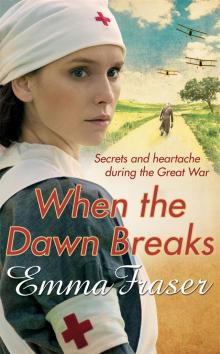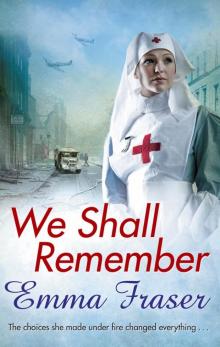- Home
- Emma Fraser
We Shall Remember Page 2
We Shall Remember Read online
Page 2
‘Phone me,’ Magdalena pleaded, as a maid opened the front door, ‘as soon as you have any news.’
‘Of course,’ Irena promised, kissing her one more time. ‘Now go back inside.’
She drove as fast as she dared but outside the city she was forced to slow to a crawl. The road was blocked by a tide of people, travelling in both directions: those with cars – the richer Varsovians – heading out of the city, suitcases tied to their roofs; and the country folk – carts piled high with chairs, beds, suitcases and even livestock, the sick, the old and the very young clinging precariously to whatever they could hold onto – heading towards the city. Those without transport walked, clutching suitcases with one hand and their children with the other. Directly in front of Irena was a family, the mother holding onto her two children by the hands while the father, almost bent double under the weight of several suitcases, led the way.
She tooted the car horn, but it made little difference. It would have been quicker to walk – or to take a train, which, she could see, were still running.
It was then that the German plane had swooped down and opened fire on the train. Irena watched in horror as bullets punctured the metal and windows exploded in a hail of glass.
The plane climbed sharply, and panic-stricken passengers spilled from the train, scattering in all directions.
But the plane circled and came back, losing height rapidly. As people threw themselves into ditches or under carts, it opened fire again.
Irena scrambled out of the car and rolled under the chassis, covering her ears in a vain attempt to blot out the screams of terror and the relentless sound of machine-gunfire.
Now, as the sound of their engines faded, the air was filled with the terrible cries of the injured and the dying. Slowly, those who could lurched to their feet while others sat in shocked silence as if they didn’t know where they were.
Irena forced herself to crawl out from under the car and staggered to her feet. As she took in the scene, bile rushed to her throat. She’d never seen anything like the carnage in front of her. Everywhere she looked there were torn and mutilated bodies, their belongings scattered across the field. Her body shaking uncontrollably, Irena moved towards the inert form of the man who had been reaching towards her and, although she knew it was pointless, felt for his pulse. Nothing. Her chest tightened. If only she’d been braver, he might still be alive.
Near him, a woman was on her knees, her body folded towards the ground as if in prayer, the back of her head caved in. Next to her corpse, a man cradled a bloodied youth in his lap. Despair washed over Irena. There were so many. What could she do? Where should she start?
On legs that felt boneless, she stumbled over to a man desperately calling for help. His wife had been hit in the shoulder and was pale and clammy, but conscious.
‘It’s okay,’ Irena murmured. ‘You’ll be okay.’
She tore away the shredded cloth from the woman’s shoulder and within seconds, dark gelatinous blood covered her fingers. The exit hole was about the size of a baby’s fist. If the bleeding couldn’t be stopped, the woman would die.
Irena ripped a strip from her dress and stuffed it in the wound. Almost immediately her temporary bandage was saturated with blood.
The woman needed surgery. She needed a proper doctor. Someone who knew what they were doing. As panic threatened to overwhelm her, Irena forced herself to take a deep breath. Think.
She grabbed the husband’s hand and placed it on top of the dressing. ‘We need to get her to hospital.’ She pointed to the car. The man nodded and scooped his wife into his arms.
‘Put her in the back seat. Press down on her wound as hard as you can and keep pressing, no matter what happens.’ Irena prayed the German planes would stay away a little longer.
As they hurried towards the vehicle Irena caught sight of the family who’d been walking in front of her car just minutes before. The father was face down, a few feet away from his wife and children. His blond-haired son, who couldn’t have been more than five, held his cap in the fingers of one hand while the other stretched out towards his mother as if he were reaching for her. She lay beside him, her body covering her little girl. Irena turned to the man next to her. ‘I’ll be back as soon as I can.’
With her heart beating a sickening tattoo in her throat, Irena ran towards the family. She stopped by the father and felt for a pulse. Nothing. Then she knelt by the little boy’s broken body. His bony legs protruded from his too-big shorts and he had a scrape on his knee that was beginning to form a scab. He must have fallen a few days earlier. His green eyes, wide with surprise, stared sightlessly at the sky.
Bullet holes had riddled his small body, almost cutting him in two. Blood had soaked through both his shirt and his neatly buttoned grey jacket and pooled in an untidy circle around his body.
She drew in a long, shuddering breath and turned her attention to the mother and daughter.
As she’d suspected, the mother was dead too, her head almost severed from her torso by the force of the bullets. The little girl, however, had been shielded by her mother. It was just possible she was still alive.
Mustering all her strength, Irena dragged the woman off her child. As the mother’s body sprawled on the ground, her neck lolling to the side at an unnatural angle, bile rose once more in Irena’s throat, making her gag.
The girl was covered in blood and Irena’s hands shook as she felt for a pulse. It was there, thank God, rapid and weak, but there nevertheless. The blood must be her mother’s.
Irena ran her hands across the child’s body before lifting her dress. It was difficult to be sure with so much blood everywhere but she couldn’t see any bullet wounds. But then as the child moaned, she saw it: a small hole, the size of the tip of Irena’s thumb, right at the top of the child’s leg.
She reached into her pocket, yanked out a handkerchief and folded it into a small square before placing it on top of the wound. Then she tugged off her scarf and tied it tightly around the child’s thigh. If she could get her to hospital the little girl might have a chance.
She picked her up, carried her back to the car and laid her gently on the front passenger seat.
She looked around. There were still so many injured. So many who would die without immediate help. But if she stopped to help them, the two in her car would die. She ran around to the driver’s seat, clambered in, and cranked the starter motor. Relieved it caught first time, she looked over her shoulder at the couple. The husband’s face was almost as pale as his wife’s.
‘How is she?’
‘She’s bad. What took you so long? She needs to get to hospital.’
‘Just keep pressure on the bandage.’ Irena laid one of her hands on the temporary dressing covering the child’s leg and pressed down. She manoeuvred the car between the victims, her blood-covered fingers slipping on the steering wheel, but she knew she couldn’t stop, even to wipe them.
If the German planes came back now they’d be sitting ducks.
It seemed to take forever to reach the hospital. Irena had to negotiate her way through more fleeing people and with every minute that passed, her injured passengers’ chances of survival were decreasing. She kept glancing at the sky, but there was no sign of the German planes. Every so often, she asked the husband for an update on his wife’s condition. She was still bleeding and along the way had lost consciousness. He kept murmuring to her, telling her she was going to be all right, if only she would hold on. In the passenger seat beside Irena, the child’s breathing had become laboured and she looked pale and clammy. If the wound didn’t kill her, shock might.
At last, the hospital appeared in front of her. It had been hit too. Large chunks of the perimeter wall were missing and the doctors’ quarters to the left of the main building were on fire. She drove into the forecourt and yanked on the handbrake.
It was almost as chaotic here as it had been on the roads. Horse-led carts and ambulances with injured men, women and children stream
ed in through the gates. Nurses and doctors scurried around, examining the injured briefly, before calling out orders to stretcher-bearers. The Polish Red Cross were there too, rushing towards each ambulance as it arrived.
Irena leaped out of the car and lifted the little girl into her arms. A nurse hurried over to her.
‘What’s wrong with her?’
‘She has a bullet wound to her groin. I’m not sure if the femoral artery is damaged but just in case I applied a tourniquet. There’s another casualty in the back – a woman. She took a bullet in her shoulder. Her husband is keeping pressure to the wound. There are many more casualties out there. About five miles away. On the main road west. A lot of them are dead, but there are others who need medical attention.’
‘I’ll take her.’ The nurse gestured to a man on the steps to come forward. ‘Get someone to deal with the woman in the back, then send some ambulances towards Wesola. See if you can find a nurse to go with them. If you can’t, someone from the Red Cross will do.’
‘They need a doctor,’ Irena protested. ‘And more than one. The planes might have come back.’
‘All the doctors are busy, but I’ll see who I can find.’ As she talked, the nurse placed the child on the stretcher and signalled to the stretcher-bearers. ‘Take her inside. I’ll come in a minute and check her wound before I decide what needs to be done.’ She glanced at Irena. ‘I don’t want to take the bandage off until I’m certain we can control the bleeding.’
At least the nurse knew what she was doing. She had to be a year or two younger than Irena, but, outwardly at least, she was calm and confident.
‘I could go with the ambulance,’ Irena offered. ‘I’m a medical student.’
The nurse shook her head. ‘You don’t look in any state to help.’ Her voice softened. ‘You’ve done well so far and we’re going to need all the help we can get later.’ She wiped a bloodstained hand across her forehead and, for a moment, Irena saw the fear in her eyes. But just as quickly it was gone and the professional mask was back in place. ‘You’re covered in blood, you know. If you plan to stay and help you should wash first – and get changed. We don’t want to terrify the patients any more than they are already.’
As she turned away, Irena grabbed her arm. ‘I’m all right. Just tell me what you want me to do.’ Her teeth were chattering so much she could barely speak.
The nurse gently removed Irena’s hand, placed her arm around her shoulder and led her across to a bench. ‘It’s going to be a long day and an even longer night. Take a few minutes to pull yourself together. Then, if you really want to help, report to Sister Radwanska. She’ll tell you what to do.’
Irena started to protest, but without warning tears blurred her vision. She wanted to follow the nurse inside, she wanted to help, but she no longer trusted her legs to support her. Instead, she buried her head in her hands and wept.
Chapter 2
Edinburgh, 1989
‘There has to be some mistake,’ Sarah said. ‘I don’t know a Lord Glendale. Never even heard of him.’
She studied the man across the desk. Alan Bailey had a spot on his chin and had cut himself shaving. If indeed he even shaved. He looked barely old enough to be out of school let alone a partner in a firm of posh Charlotte Square solicitors. He was wearing a suit that must have cost a fortune, a pinstripe shirt and a ridiculously flamboyant bowtie. The office was empty apart from the over-large desk and three chairs. It was quiet, almost unnaturally so, given the proximity of Princes Street.
When she’d opened the letter asking her mother to make an appointment to see one of the partners at Hardcourt & Bailey, Sarah had phoned to tell them her mother was in hospital.
‘I’m sorry to hear that,’ Alan Bailey had said smoothly, but without the slightest hint that he meant it. He’d paused. ‘Will she be discharged soon?’
‘No. Not in the immediate future.’ Not that it was any of his business. ‘Look, perhaps you should tell me what this is about?’
‘It’s really a matter best dealt with in person,’ Bailey muttered.
‘In that case,’ Sarah suggested, ‘can I come instead of my mother?’
‘Would you mind holding the line for a moment?’ There was the sound of someone covering the receiver with a hand and then the muffled voices of two people. While she waited, Sarah added milk and wine to her shopping list on the hall table.
‘Sorry to keep you, Miss Davidson, but I needed to have a word with my senior partner. He thinks we should speak to Mrs Davidson in person.’
Sarah’s jaw tightened. ‘My mother can’t talk and can only walk with support, so it’s unlikely she’ll be able to come to your office any time soon. She’s in the rehabilitation ward of Astley Ainslie Hospital, if you’d like to check with her doctors.’
‘Perhaps we could visit her at the hospital.’
‘Only immediate family are allowed to visit at the moment.’ Sarah wasn’t sure if this were true. It hadn’t come up in conversation with the nursing staff as Sarah was the only visitor her mother ever had. But Mum was in no condition to be bothered by solicitors. Come to think of it, Sarah was in no condition to be bothered by solicitors. On top of the twice-daily trips to the hospital – and the visits to her mother’s house in the Borders to check for mail and to see everything was all right – there was work to think about, too. Her boss had been sympathetic about Sarah taking time off at first and had given her a week’s compassionate leave, but over the last few weeks he’d become increasingly fed up with her frequent absences from the office. If it weren’t for the fact her curiosity had been piqued by the solicitor’s letter, she would have been tempted to tell the firm of Hardcourt & Bailey – and Alan Bailey in particular – to take a jump.
Even then Alan Bailey had hummed and hawed about it being irregular but, if she were indeed Lily Davidson’s daughter, and could prove her identity by bringing her passport along, he supposed it would be all right.
But the last thing she’d expected when the time of the appointment finally arrived was this. A complete stranger had left two properties to her mother, should the solicitors fail to locate a woman called Magdalena Drobnik.
‘There is no mistake. Lord Glendale also asked that your mother be given this.’ Bailey handed her an A3 envelope.
Sarah turned it over in her hands. It was made of thick, good quality paper and had Mum’s name on it, written with a fountain pen in a neat, decisive handwriting. Perhaps inside was a letter explaining the strange bequest? But she should get Mum’s permission before she opened it. Dealing with her mother’s business correspondence was one thing, personal letters quite another.
‘And as for Magdalena Drobnik? Who is she?’
Alan Bailey sighed. ‘We were rather hoping your mother would be able to help us with that.’
‘I can’t recall her ever mentioning her.’
He leaned back in his chair and studied her as if he were a teacher and she a schoolgirl he’d caught smoking behind the bicycle shed. ‘As I told you, your mother will only inherit should we not be able to find Miss Drobnik or if she’s deceased. We’ve started looking for her but so far have drawn a blank.’
‘And if you don’t find her, Mum will inherit Lord Glendale’s Edinburgh house and another in Skye. I still don’t understand. Why my mother?’
‘I’m afraid I couldn’t tell you even if I knew.’
‘Didn’t whoever made out the will ask Lord Glendale? One of the senior partners perhaps?’
‘My father made out the will. Sadly he died last year. Even if he were still alive, he might not have been able to shed any more light than I can. Our job as solicitors is to draw up wills, not to question their contents.’ He sat upright, picked up a pen and twirled it between his fingers. ‘Lord Glendale’s instructions were straightforward. Apart from the bequest, on his death, your mother was to be handed the envelope I have just given you.’ He cleared his throat before continuing. ‘The estate includes a house in Charlotte Square – just across
from here, actually – as well as one in Skye. It may well be that the house in Skye will have to be sold to cover the inheritance tax that will be due prior to the estate being settled. Or, should your mother go on to inherit, she could choose to keep it and sell the Charlotte Square house, although I would advise against it. The Edinburgh property is more likely to keep its value. In the meantime, your mother has been appointed joint executor along with us. We hold a set of keys to both properties should you require access.’
Why on earth would Lord Glendale have named her mother in his will? Could they have been lovers? It was entirely possible that her mother had had a life Sarah knew nothing about. The thought of her mother having a secret lover both depressed and warmed her. It would be good to think she’d found love, even late on in life. She’d never even known her mother to have a friend. However, if they’d had a relationship, surely Sarah would have met him?

 When the Dawn Breaks
When the Dawn Breaks Greyfriars House
Greyfriars House We Shall Remember
We Shall Remember The Shipbuilder’s Daughter
The Shipbuilder’s Daughter